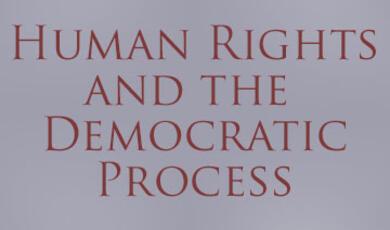What Rights and Duties are Missing from the U.S. Constitution?
Share
- Details
- Text
- Audio
- Downloads
- Extra Reading
Regarding the US Constitution, there is a major split between the Originalists (typically conservatives) and those who believe in an organic document that grows with the times. There have been enormous changes since 1789 – the internet is just one example – and the document must change one way or the other.
This lecture explores some of the unenumerated rights that might be added. These are not without their own subjective cultural elements. For example, Europeans are much more focused on ‘privacy’ than Americans, and it is debatable whether free speech is truly consistent with privacy.
Download Text
Responding to Populism with Populism: Some of the Rights We Are Missing in Britain
Clive Stafford Smith
Thursday 10 April 2025
Unapologetically, I am going to diverge slightly from my original topic on this, my fifth Gresham lecture. I had planned to discuss rights that are not in the U.S. Constitution that ought to be there. For the most part, this is a subject that looks at the evolution of society since 1789, when the Constitution was created, and considers what must be added or amended. For example, considering Freedom of Speech in the First Amendment, the Founders could not have imagined the influence of the internet, and of private corporations that control social media. Looking at the Second Amendment’s right to bear arms, originally framed in the era of the musket, they could not have imagined how the modern private armory might include drones or nuclear weapons. And so on.
Essentially, then, my plan had been to discuss new ways in which we could protect citizens from being overcome by the power of the government, or its financially elite allies.
Yet the essence of my chosen topic was that the world changes. Never has this been more true than in the first two months of the second presidential term of Donald Trump, who is a man on a mission to reshape the United States before the 22nd Amendment prohibits him from running for a third term. It would, in my view, by foolish to keep my head in the dusty tomes of theory when there is a seismic shift in the world. Indeed, if I have to define the crisis facing my liberal allies in a sentence, it is that we are too focused on defending against Trumpism, and we are ignoring our own best defense – which is to sally forth armed with our own ideas.
While the term “populism” has had a bad press recently, it means, at its core, a range of political stances that emphasize the idea of the 'people' and often position this group in opposition to a perceived 'elite'. In 1858, Alphonse Marie L. de Prat de Lamartine, a man with a wonderfully French name, used the term populism as the antonym of “aristocratic”,[1] and if this is the definition we accept, who can really disagree with such a philosophy?
Latin America has, in my lifetime, been an experimental cauldron of populism. While Peru’s Alberto Fujimori may have pursued a neoconservative variety, Hugo Chavez of Venezuela promoted a very socialist agenda in his version. Overall, Latin America populism is more often seen as a political phenomenon tied to modernization, mass mobilization, and developmentalist ideologies – in a word, a species of Socialism or Marxism.
I am writing this from the U.S., where the there is a rising tide of anger among rank and file Democratic party members at the way in which their leaders in Washington are responding to Donald Trump. Indeed, Democratic senators spend their entire time whinging about Trump is doing.
In many ways the same is true of the “left wing” in Britain even though Keir Starmer is Prime Minister: he spends vastly more time seeking to neutralize the appeal of Nigel Farage and his Reform colleagues than promoting anything that looks like evolutionary socialism. He promises to be hostile to immigrants more effectively than the Conservatives; he aims to balance the budget at the expense of those on benefits. “A study conducted by Chris Hanretty, a professor of politics at Royal Holloway, University of London, positions Starmer’s political stance to the right of nearly all 401 Labour MPs.”[2]
It is said that “Starmer does not have a lot of his own politics, but … he has spent a huge amount of a rich donor’s money on polling the party’s membership to find out what kind of candidate they’d back.”[3] It is said of Starmer (by himself) that he does not “have any ideology at all.” The critical question, if he is to lead the party to success, is whether he has any ideas at all – ideas that will offer a positive alternative to those presented by Farage. One overarching lesson of History, let alone the last few years, is that if the Labour Party tries to outflank the right wing by trying to be equally right wing, they lose their ability to inspire, and ultimately they lose an election without having achieved much other than to create a new, even more right wing, ground to do battle.
It was not ever thus. In my youth, one would never have seen people on the right in Britain as populists, only Labour on the left. While the strategy of the Conservatives has generally been to inspire fear in the electorate – often, the fear that democratic socialists would ruin the economy – the Labour Party used to promise measures that would be popular among the working classes. They would raise taxes on the wealthy; they would nationalize the railways and the buses, creating genuinely public transport for those who could not afford to run a car; they would build council houses, creating the human right to a roof over your head; the NHS was the ultimate Labour party policy, creating a citizen’s right to free healthcare.
These were populist promises. Whether they are facing the populism of Trump or Farage, the Democrats and Labour have to remember how to inspire. In other words, to paraphrase the rock band U2, “populism is a song that the right has tries to steal from the liberals, and the liberals need to steal it back.”
* * *
As a setting for throwing out a few ideas, I thought I would take the BBC article that identified seventeen major policy actions by President Trump in his second week in office. They were as follows:[4]
1. Proposed the US 'take over' Gaza
2. Planned to put thousands of USAID staff on leave
3. Imposed tariffs on China and pulled back threats on neighbours
4. Pressed ahead with plan to incentivise federal workers to resign
5. Sanctioned the International Criminal Court
6. Ordered strikes against the Islamic State group in Somalia
7. Withdrew from United Nations institutions
8. Sent first plane of deportees to Guantanamo
9. Demanded Ukraine provide rare earth resources
10. Banned transgender competitors from women's sports
11. Released water from dams in California
12. Announced taskforce to tackle 'anti-Christian bias'
13. Intervened in a dispute in the golf world
14. Removed climate change mentions from government websites
15. Increased access for Musk's Doge
16. Joe Biden's security clearance revoked
17. Scraps task force that seized assets of Russian oligarchs
One might not agree with many – or any – of these ideas, but it would be difficult to deny that Trump was getting on with things. He was seen by people, particularly his MAGA base, to be an ‘Action Man’. Indeed, he his strategy seemed to be to “flood the zone”, an American football phrase for essentially sending out so many stories that the other side would only comment on his strategy rather than come up with one of their own.[5]
This has allowed him, of late, to control the entire narrative. The only way to respond is generally to dismiss what he is doing, and come up with other initiatives – in terms of the mantra that guides the First Amendment, “the only answer to a bad idea is a better idea.” In this instance, while I do not wish to debate the merits of Trump’s plans, they provide a framework within which we can offer our own.
So, while I won’t address all 17 actions, here is what I would do were I in Keir Starmer’s position.
- Sport
Let us take perhaps the least relevant of Trump’s ideas first, which involved the spat in the golf world between the Saudi-backed LIV tour and the PGA. In reality this idea was “weak populism”: golf is a relatively elite sport, and few people care about LIV, even golfers. It is an issue because it is close to Trump’s heart, as it is his sport.
Starmer did not bother to make any statement on it, for obvious reasons. Yet he had an opportunity to stake out his own position. He is a keen footballer, albeit not always at his best when taking penalties. Football is, in the words of Peter Terson in his play Zigger-Zagger, the true national religion of Britain. Meanwhile, just as Jesus complained about the money changers in the temple, barely a week goes by without a complaint that the price of tickets is squeezing out the faithful. If I was Starmer, I would legislate to set a rigid maximum (perhaps half of what it currently is) for the Premier League’s regular tickets.
Who would complain? Certainly, some members of the elite. Yet for all his complaints about Manchester United’s parlous economics, Jim Ratcliffe is planning to spend £2 billion on a new stadium that will supposedly be visible from Liverpool and that will inexorably drive up prices. Perhaps Ratcliffe would take the issue to court, but they would not get far – the government used to mandate coverage of sports events on the BBC, free to viewers.
If ticket prices were halved, Starmer’s approval ratings would probably double.
- Gaza
Donald Trump tweeted the fabulously bizarre AI video of The Gaza Riviera, with its golden statue of himself, and with Elon Musk throwing money in the air. It was rightly deemed risible, but for the people of Gaza it was no laughing matter. I doubt it lost him any MAGA votes, and ironically his unwavering support for fellow-right-wing-populist Benjamin Netanyahu in 2025 came on the heels of his significantly antisemitic campaign tactics in 2017.
How should Starmer respond? It is certainly not antisemitic to want peace in Gaza, as an increasing number of Israelis make clear in their demonstrations. One of the programmes that I have most admired in the US over the decades was VISTA – the wonderful acronym for “Volunteers In Service To America” – which marches arm-in-arm with the Peace Corps, both ideas the Trump disdains, but that both achieved wonders for educating isolationist Americans while assisting those in need. Along the same lines, the French created MSF (Medecins Sans Frontieres, or Doctors without Borders).
Why not respond to the humanitarian crisis in Gaza by dispatching 500 medical professionals to help the victims of war – which would simultaneously ratchet up the political cost to Netanyahu of continuing to bomb civilians?
- The International Criminal Court
Trump does not like the ICC and he has imposed sanctions on some of its members, most recently for levelling charges at Netanyahu. Indeed, the US dislikes the ICC in general. Some feel it is acceptable to prosecute former Eastern European or African dictators, but Americans generally dislike our military (“American boys and girls”, but no longer Trans people) being forced into foreign courts, even if they tortured people in Abu Ghraib or elsewhere. This is short sighted, but even Trump’s most antisemitic supporters are probably behind him on this one.
I am not, personally, a big fan of continuing down the path of criminalizing more and more things, and sending more people to prison. But in July 2024, one of the first things Starmer did, with his history of human rights lying alongside his former role as Director of Public Prosecutions, was to drop the UK’s opposition to the arrest warrant for the Israeli prime minister. If he wants to burnish his credentials, there is surely a case for showing strong support to the ICC in its investigation of war crimes. Perhaps he could persuade his old friends in Chambers to go and volunteer at the ICC for a few months to help with the backlog, and get the notoriously slothful court to move on various pending cases of genocide. He could have them do it at zero cost (“pro bono”, meaning “for the good” in Latin, but also free) and be seen as striking a blow against genocide.
- Withdrawing from UN institutions
Trump is notoriously hostile to the United Nations as well. He views it as oppositional to American interests, even though the US gets considerable kudos from having the headquarters in New York. He has slashed funding and promised to neutralize its limited powers.
To be sure, the UN has its flaws, but some of them are not often remarked. One is the structure of the Security Council. There are five permanent members, each with a veto: the U.S., Russia, China, Britain and France.
I was once invited to a formal dinner by the British Ambassador in DC and I raised this with him. How, I asked, can Britain expect to promote democracy worldwide if we insist on the right to veto what the other 190 countries want? (Equally, I threw in, how can we demand limitations on nuclear weapons if we continue to claim the right to such weapons ourselves?) His answer – his wry smile perhaps betraying the implausibility of the position – that that this “allows us to punch above our weight.”
Even if there is some slight justification for the US, Russia and China to have a veto, giving the same power to Britain and France is just a relic of a bygone era. Starmer could open negotiations to democratize the world, and make friends rather than enemies, by suggesting that France and Britain give up their unjustifiable vetoes in favour of one for Africa and one for South America.
- Immigration
Xenophobia against Hispanics is nothing new in the US, as there is a tidal wave of it every fifty years or so – the first serious US plan to kick out Mexicans was given the fantastically racist titles of Operation Greaser in the 1890s, and the Eisenhower-era edition was dubbed Operation Wetback. Trump’s big idea on immigration is likewise to encourage hatred and fear. Obviously his banner headline on sending 30,000 of the “worst of the worst” criminal immigrants to Guantánamo Bay was no more factual than was President George W. Bush’s promise to fill the place up with the “worst of the worst” terrorists. Guantánamo is easy to criticize and I plan to do it at length in a future lecture next year.
But what might Starmer do that would win him votes? In the end, if he wants to follow his own heart rather than Nigel Farage’s, he has to be an advocate for the positive elements of immigration. While major steps are probably beyond him for now, he could readily propose returning to the original student exchange process with Europe, whereby he would win over the youth vote who would once again be able to study across Europe.
- Russian Oligarchs & Ukrainian Minerals
Trump did away with sanctions on Russian Oligarchs, while demanding that Ukraine should turn over much of its mineral wealth (and its power stations) to the US. In response, the best that Starmer could do was propose using seized Russian assets to fuel the war. What might he have done?
As is true of various corrupted regimes around the world, there is plenty of dirty Russian money in London, and I have no problem with impounding it, preferably to transfer back at some point to the rightful owners, the Russian people. But surely for anyone seeking a liberal populist response that might help end the war, rather than prolong it, Starmer should look at Putin’s purported motives? One that ranks high on his list is the fear that NATO would come to Russia’s border if Ukraine has membership. Why not propose that NATO should cross over that border – and invite Russia to be a member?
George Robertson, a one-time Labour defence minister, recounts “an early meeting with Putin, who became Russian president in 2000. ‘Putin said: “When are you going to invite us to join Nato?” And [Robertson] said: “Well, we don’t invite people to join Nato, they apply to join Nato.” And he said: “Well, we’re not standing in line with a lot of countries that don’t matter.”’”[6]
Why not propose this again? If both Ukraine and Russia were members of NATO, there would be no reason for Russia to fear NATO encroaching on its border. At the very least, if he spurned the offer, it would take away Putin’s pretext for war. And it is just the kind of thing Trump might go along with.
* * *
In conclusion, then, why doesn’t Starmer counter the right-wing “populism” with some of his own, that makes the world a better place rather than breaking it down?
© Professor Clive Stafford Smith 2025
[1] Alphonse Marie L. de Prat de Lamartine, History of the Constituent Assembly, 1789-90 (1858).
[2] Aysu Bicer, UK Premier Keir Starmer among Labour’s most right-wing MPs, study reveals (Dec. 30, 2024), available at https://www.aa.com.tr/en/europe/uk-premier-keir-starmer-among-labour-s-most-right-wing-mps-study-reveals/3438301# (accessed 2025.03.30).
[3] Andrew Rawnsley, Get In by Patrick Maguire and Gabriel Pogrund review – behind the scenes with Morgan McSweeney, Labour’s arch strategist, Observer (9 Feb. 2025), available at https://www.theguardian.com/books/2025/feb/09/get-in-by-patrick-maguire-and-gabriel-pogrund-review-inside-story-of-labour-under-keir-starmer-morgan-mcsweeney (accessed 2025.03.30).
[4] Mallory Moensch, 17 things Trump and his team did this week, BBC News (Feb. 8, 2025), available at https://www.bbc.co.uk/news/articles/cjdep9j31l8o (accessed 2025.03.30).
[5] In the notorious words of Steve Bannon, “The Democrats don't matter. The real opposition is the media. And the way to deal with them is to flood the zone with shit.” Brian Stetler, The Infamous Steve Bannon quote is the key to understanding America’s crazy Politics, CNN News (Nov. 16, 2021), available at https://www.cnn.com/2021/11/16/media/steve-bannon-reliable-sources/index.html (accessed 2025.03.30).
[6] Jennifer Rankin, Ex-Nato head says Putin wanted to join alliance early on in his rule, The Guardian (Nov. 24, 2021), available at https://www.theguardian.com/world/2021/nov/04/ex-nato-head-says-putin-wanted-to-join-alliance-early-on-in-his-rule (accessed 2025.03.30).
This event was on Thu, 10 Apr 2025
Support Gresham
Gresham College has offered an outstanding education to the public free of charge for over 400 years. Today, Gresham College plays an important role in fostering a love of learning and a greater understanding of ourselves and the world around us. Your donation will help to widen our reach and to broaden our audience, allowing more people to benefit from a high-quality education from some of the brightest minds.


 Login
Login






